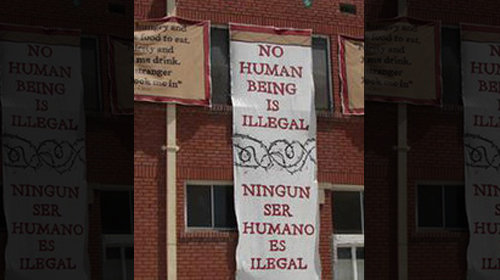
In the midst of an election year in which Democrats and Republicans seem prepared to fight about whether the sky is blue, here’s one thing that both parties actually agree on: the lifeline President Obama extended last week to America’s undocumented youth is not a permanent solution.
Last week the president used well-established executive authority to institute“deferred action” for this class of DREAMers—promising students who are American in all but status—which will halt their pending or future deportations for a period of two years. Although Republicans have criticized the measure as an expedient, short-term solution, the president has made clear this policy is not a permanent fix: “This is a temporary stop-gap measure that lets us focus our resources wisely while giving a degree of relief and hope to talented, driven, patriotic young people.” Indeed, the president ended his announcement by calling on the only branch vested with the ability to grant DREAMers longstanding relief: Congress.
The DREAM Act, a decade-old piece of legislation that once enjoyed impressively broad-based support, has languished along with prospects of real bipartisanship in this increasingly polarized legislature. But Senator Marco Rubio, a Republican from Florida, has long promised an alternative to DREAM Act that would provide deportation relief for the same class of youth who stand to benefit from DREAM. While the details of his proposal have remained hazy, Senator Rubio pledged that a path to legalization would be a central tenet of his proposed legislation and appeared poised to introduce it later this summer.
Obama’s announcement, which so electrified the immigrant community last week, would have seemed to be just the boost Senator Rubio’s in-the-works legislation needed to sail through Congress. Instead, Rubio is now threatening to abandon this proposal altogether, complaining through his spokesperson that the president’s announcement has taken a “lot of urgency” out of the issue.
Far from it. The DREAM Act, or some version of it, remains every bit as urgent as ever. The president’s grant of deferred action is intended to last two years—at best. Under a Romney administration, it may not even make it that long. He has failed to articulate whether or not he would retain Obama’s policy if he becomes president, and he could very easily reverse it. Mere months from now, the same DREAMers who are cautiously celebrating this temporary grant of relief may once again be subjected to the threat of deportation.
Senator Rubio, who has eloquently spoken about his own immigrant background and empathy for the plight of migrant families, has reportedly spent months in talks with Republicans and Democrats to achieve a permanent, bipartisan solution to the crisis facing DREAMers. It is a shame that the senator has suddenly abandoned this path simply because President Obama’s policy preceded his own.
Senator Rubio’s spokesperson noted regretfully that the president’s policy would not offer the “permanent change” that his proposal would have. This is exactly why Rubio needs to continue advocating for his proposal, and why Congress needs to make deportation relief for DREAMers a top priority. While Republicans and Democrats are engaged in election year politicking, the lives of our young, promising immigrant youth hang in the balance. Now that both parties have agreed that the president’s action is not a permanent solution, it’s time to take action that is.
Learn more about immigrants' rights: Sign up for breaking news alerts, follow us on Twitter, and like us on Facebook.

